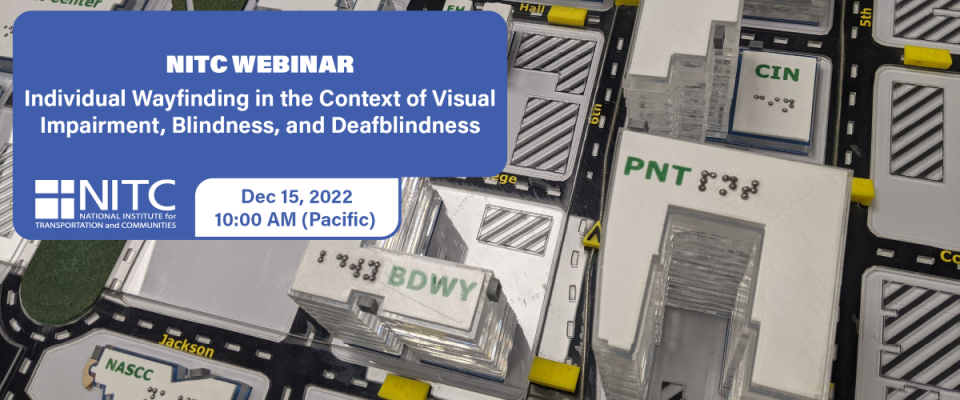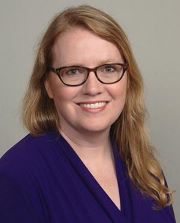
PRESENTATION ARCHIVE
OVERVIEW
In this presentation we will highlight our past research on human indoor-outdoor wayfinding on an urban college campus. Our work is aimed at facilitating independent travel for people with blindness and low vision. Our research was funded by two successive grants from the National Institute for Transportation and Communities/US Department of Transportation. One of the central research questions sought to capture wayfinding preferences, information needs, and lived experiences of blind and low-vision pedestrian travelers. The projects afforded close collaboration with external partners, and foremost the American Printing House for the Blind. Our focus in the presentation will be on the discussion of considerations for wayfinding technology, human subject research design, findings and lessons learned across the two projects.
KEY LEARNING OUTCOMES
- Foster greater awareness related to the navigation preferences of visually impaired travelers
- Enable a better understanding of supports for seamless navigation
- Create familiarity with the Santa Barbara Sense of Direction Scale
- Share conceptualization of sustainable impacts in cities pertaining to pedestrian mobility
THE RESEARCH
This webinar is based on a study funded by the National Institute for Transportation and Communities (NITC) and conducted at Portland State University, with collaboration and support from the American Printing House for the Blind and PSU's Digital City Testbed Center (DCTC). Read more about the research: Seamless Wayfinding by Individuals with Functional Disability in Indoor and Outdoor Spaces: An Investigation into Lived Experiences, Data Needs, and Technology Requirements.
SPEAKERS
Amy Parker, Portland State University
Amy Parker, EdD, COMS, is an assistant professor and the coordinator of the Orientation and Mobility (O&M) Program in the Special Education Department. In 2009 she completed her doctorate in special education, with an emphasis in deafblindness and a certification in orientation and mobility, through a leadership and enrichment fellowship funded by the Office of Special Education. Using participatory methodologies with community stakeholders, she has worked to design accessible multimedia learning modules for national technical assistance and personnel preparation. She is currently co-leading two federal grants to prepare O&M Specialists throughout the Pacific Northwest and has hosted an interdisciplinary event called Mobility Matters for the past 5 years on PSU's campus. Her research interests include orientation and mobility for individuals with complex disabilities, communication interventions, participatory action research with people with disabilities and their families, and community-based partnerships to create social change.Martin Swobodzinski, Portland State University
Dr. Martin Swobodzinski is an associate professor in the Department of Geography at Portland State University with a specialization in geographic information science. He received his doctorate in Geography in 2012 within the joint doctoral program of San Diego State University and the University of California at Santa Barbara. Dr. Swobodzinski is an empirical researcher who subscribes to the scientific method and inductive reasoning, with an emphasis on experimentation and human subject testing. He has a long-standing interest in spatial cognition, an interdisciplinary field of research concerned with the acquisition, organization, utilization, and revision of spatial knowledge that informs human behavior. He also has a background in applied (spatial) computer science, which provides for a focus on methodological, analytical, and computational aspects in his work. The overarching theme of Dr. Swobodzinski's scholarship and research is the investigation of technology as it mediates the spatial behavior, reasoning, and choice making of individual human beings. His current research agenda engages foremost with the study of human wayfinding under consideration of visual impairment and blindness.PROFESSIONAL DEVELOPMENT
This 60-minute webinar is eligible for 1 hour of professional development credit for AICP (see our provider summary). We provide an electronic attendance certificate for other types of certification maintenance.
LEARN MORE
Sign up for our newsletter to get updates on our events.
This webinar is hosted by the Transportation Research and Education Center (TREC) at Portland State University. The research was funded by the Summit Foundation and the National Institute for Transportation and Communities (NITC), a program of TREC and one of seven U.S. Department of Transportation national university transportation centers. The NITC program is a Portland State-led partnership with the University of Oregon, Oregon Institute of Technology, University of Utah and new partners University of Arizona and University of Texas at Arlington. We pursue our theme — improving mobility of people and goods to build strong communities — through research, education and technology transfer.

